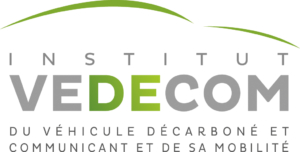
About VEDECOM
Created in February 2014, VEDECOM is an Institute for Energy Transition (‘ITE’), dedicated to individual, carbon free and sustainable mobility, established as part of the French governmental plan, ‘Investment for the future’. It contributes to the ‘Autonomous vehicle plan’, which was recently incorporated into the Solution for Future Industry Programme alongside Eco-mobility; both of which are part of ‘Nouvelle France Industrielle’, the government’s plan to invigorate the country’s industry.
As a public-private partnership-based foundation, VEDECOM is based on an unprecedented collaboration between industries of the automotive and aerospace sectors, infrastructure and services operators in the mobility eco-system, academic research institutions and local authorities. VEDECOM aims at becoming a European innovation leader in the fields of electrified vehicles, autonomous and connected cars and new infrastructure and services for shared mobility and energy.
VEDECOM’s research is focused on three areas:
• Vehicle electrification
• Connected and automated driving
• Shared mobility and energy.
Also, VEDECOM acts as an approved training institution by offering expert training and raising public awareness on innovative mobility solutions.
PSA Groupe, Groupe Renault, VALEO, UTAC and IFSTTAR are part of VEDECOM’s more than 50 members.
Some numbers about VEDECOM: over 50 members, 3 research fields, one training programme, 200 employees, 14 R&D projects, 12 European projects, more than 300 publications, 37 patents, 24 copyrighted software, 70 PhD thesis, one business branch created in February 2017.
Main role in the project
VEDECOM is responsible for the definition of use cases requirements based on the state-of-the-art, identification of critical scenarios and functional requirements at vehicle level for Key Enabling Technologies (KETs), safety requirements for consumers, and requirements for physical testing on test tracks regards KETs (WP1 leader).
In addition, VEDECOM is contributing to the:
• Methodology and procedure description based on the state-of-the-art for target use cases;
• Criteria selection for optimal scenarios for use cases related to SAE level 4 and 5 on highways and in urban environments;
• Human factors aspects and database activities, such as extracted data and different parameters profile;
• Representation of French stakeholders and target groups; cooperation with Australia.
